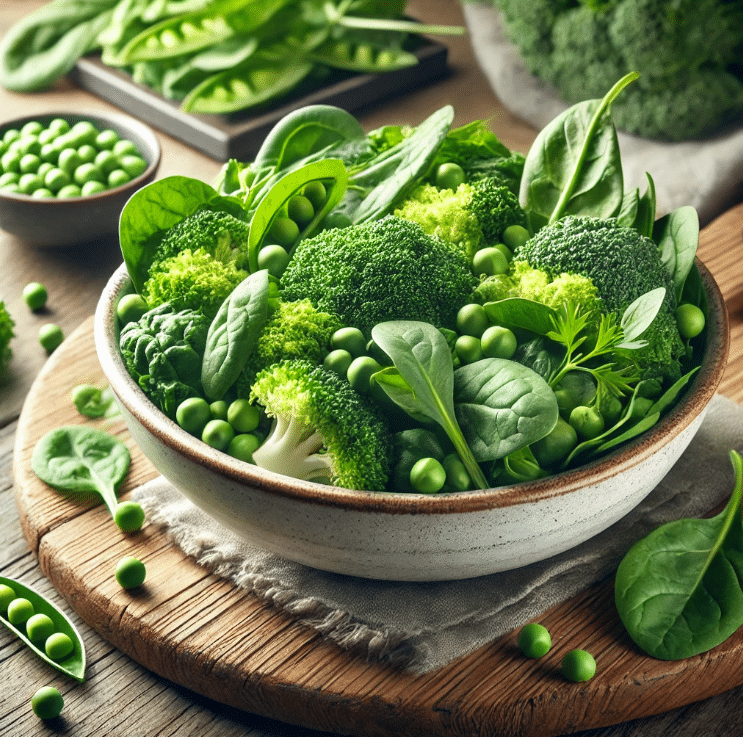Green vegetables are a powerhouse of essential nutrients that are vital for overall health and well-being. Packed with vitamins, minerals, fiber, and antioxidants, these nutrient-packed green vegetables should be a regular part of any diet. From boosting the immune system to promoting digestive health, incorporating more green vegetables into your meals can have a profound impact on your health.
In this blog, we will explore 10 nutrient-packed green vegetables that you should eat more of, highlighting their incredible health benefits and how they can enhance your daily nutrition.
1. Spinach
Spinach is one of the most well-known green vegetables and for good reason. It’s loaded with essential nutrients like Vitamin A, Vitamin C, Vitamin K, iron, folate, and calcium. This leafy green can be easily incorporated into various dishes like salads, soups, smoothies, or even scrambled eggs. The high amount of antioxidants in spinach helps to fight off free radicals, keeping the body healthy and reducing inflammation.
Nutritional Profile of Spinach (per 100g):
| Nutrient | Amount |
|---|---|
| Calories | 23 kcal |
| Protein | 2.9g |
| Fiber | 2.2g |
| Vitamin A | 2813 IU |
| Vitamin K | 483 mcg |
| Folate | 194 mcg |
2. Kale
Kale is often referred to as a superfood, and rightfully so. It’s rich in fiber, antioxidants, and several essential vitamins like Vitamin A, C, and K. Kale is particularly high in Vitamin K, which is crucial for bone health and blood clotting. It also supports heart health by reducing cholesterol and providing anti-inflammatory effects.
Nutritional Profile of Kale (per 100g):
| Nutrient | Amount |
|---|---|
| Calories | 49 kcal |
| Protein | 4.3g |
| Fiber | 4.1g |
| Vitamin A | 10302 IU |
| Vitamin K | 817 mcg |
3. Broccoli
Broccoli is another nutrient-packed green vegetable that should be a regular feature in your diet. It’s rich in Vitamin C, fiber, and a variety of antioxidants, such as sulforaphane, which supports detoxification and cancer prevention. Broccoli is also known for its ability to support immune function, promote digestive health, and protect the skin from environmental damage.
Nutritional Profile of Broccoli (per 100g):
| Nutrient | Amount |
|---|---|
| Calories | 34 kcal |
| Protein | 2.8g |
| Fiber | 2.6g |
| Vitamin C | 89 mg |
| Vitamin K | 101 mcg |
4. Brussels Sprouts
Brussels sprouts are small cabbage-like vegetables that are packed with nutrients. They are high in Vitamin C, Vitamin K, fiber, and antioxidants that help to protect the body from oxidative stress. They are particularly beneficial for gut health, as the fiber helps to promote regular bowel movements and support healthy digestion.
Nutritional Profile of Brussels Sprouts (per 100g):
| Nutrient | Amount |
|---|---|
| Calories | 43 kcal |
| Protein | 3.4g |
| Fiber | 3.8g |
| Vitamin C | 85 mg |
| Vitamin K | 177 mcg |
5. Swiss Chard
Swiss chard is a leafy green vegetable that is rich in vitamins A, C, and K, as well as magnesium, potassium, and iron. It’s known for its ability to improve bone health, support the immune system, and promote heart health. The high levels of antioxidants in Swiss chard help reduce inflammation and prevent cellular damage.
Nutritional Profile of Swiss Chard (per 100g):
| Nutrient | Amount |
|---|---|
| Calories | 19 kcal |
| Protein | 1.8g |
| Fiber | 1.6g |
| Vitamin A | 6116 IU |
| Vitamin K | 830 mcg |
6. Collard Greens
Collard greens are often eaten in Southern cooking, and they are known for their rich vitamin content and health benefits. They are an excellent source of Vitamin K, which is important for blood clotting and bone health. Collard greens also provide a good amount of fiber, folate, and calcium, all of which contribute to overall health.
Nutritional Profile of Collard Greens (per 100g):
| Nutrient | Amount |
|---|---|
| Calories | 32 kcal |
| Protein | 3g |
| Fiber | 4g |
| Vitamin A | 2335 IU |
| Vitamin K | 437 mcg |
7. Arugula
Arugula, also known as rocket, is a leafy green vegetable with a slightly peppery flavor. It is high in Vitamin K, calcium, and folate, and it also contains significant amounts of antioxidants. Arugula is known to support bone health, help manage blood sugar levels, and provide anti-inflammatory effects.
Nutritional Profile of Arugula (per 100g):
| Nutrient | Amount |
|---|---|
| Calories | 25 kcal |
| Protein | 2.6g |
| Fiber | 1.6g |
| Vitamin A | 2373 IU |
| Vitamin K | 108 mcg |
8. Green Beans
Green beans are a popular vegetable that is high in fiber, Vitamin C, and Vitamin K. They are also a good source of folate, which is essential for cell function and growth. Green beans provide a variety of antioxidants that help fight inflammation and support heart health.
Nutritional Profile of Green Beans (per 100g):
| Nutrient | Amount |
|---|---|
| Calories | 31 kcal |
| Protein | 1.8g |
| Fiber | 3.4g |
| Vitamin C | 12 mg |
| Vitamin K | 14 mcg |
9. Peas
Green peas are small but mighty when it comes to nutrient density. They are high in protein, fiber, and essential vitamins like Vitamin A, Vitamin C, and Vitamin K. Green peas also provide a good source of antioxidants, which help protect the body from oxidative stress and inflammation.
Nutritional Profile of Green Peas (per 100g):
| Nutrient | Amount |
|---|---|
| Calories | 81 kcal |
| Protein | 5g |
| Fiber | 5g |
| Vitamin A | 765 IU |
| Vitamin C | 40 mg |
10. Mustard Greens
Mustard greens are a highly nutritious leafy green vegetable that is rich in vitamins A, C, and K. They are also an excellent source of folate, calcium, and magnesium. The high levels of antioxidants in mustard greens help reduce oxidative stress and support cardiovascular health.
Nutritional Profile of Mustard Greens (per 100g):
| Nutrient | Amount |
|---|---|
| Calories | 27 kcal |
| Protein | 2.7g |
| Fiber | 3.2g |
| Vitamin A | 5005 IU |
| Vitamin K | 257 mcg |

Conclusion
These 10 nutrient-packed green vegetables are essential for maintaining optimal health. By incorporating more of these greens into your daily diet, you can experience benefits such as improved immune function, better digestion, enhanced skin health, and reduced inflammation. Whether you’re adding them to salads, smoothies, soups, or stir-fries, green vegetables are a delicious and versatile way to boost your nutrition.
For more health-related tips and wellness content, visit Healthy Vibe Hub.
FAQ: 10 Nutrient-Packed Green Vegetables You Should Eat More Of
Q1: How can I include more green vegetables in my diet?
A1: You can add green vegetables to your smoothies, soups, salads, and stir-fries. You can also snack on raw veggies like celery, cucumbers, or leafy greens.
Q2: Are green vegetables good for weight loss?
A2: Yes, green vegetables are low in calories and high in fiber, which helps you feel full longer and supports digestion. They are perfect for weight loss and maintaining a healthy weight.
Q3: What are the best green vegetables for heart health?
A3: Kale, spinach, broccoli, and Brussels sprouts are excellent for heart health. These vegetables are rich in antioxidants, fiber, and nutrients that support cardiovascular health.
Q4: Can green vegetables improve skin health?
A4: Yes, green vegetables like spinach, kale, and broccoli are packed with vitamins A and C, which are essential for healthy skin. They help in collagen production, promoting glowing and youthful skin.
Q5: How often should I eat green vegetables?
A5: It’s recommended to consume green vegetables daily. Aim for at least 1-2 servings per meal to reap the maximum health benefits.
Q6: Are frozen green vegetables as nutritious as fresh ones?
A6: Yes, frozen green vegetables can be just as nutritious as fresh ones, as they are typically frozen soon after harvesting, which helps retain their nutrients.


